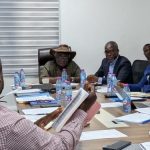A survey conducted by the Centre for Democratic Development (CDD-Ghana) has revealed that the majority of Ghanaians are not confident that the Nana Akufo-Addo-led administration can fight corruption.
The latest CDD report which randomly sampled 2,400 adult citizens from all 16 regions between May 23 and June 3 sought to measure citizens expectations of the New Patriotic Party (NPP) government’s performance in the delivery of its 2020 manifesto promises.
It also sought to identify citizens interpretation of the outcome of the parliamentary elections and the impact of the current ‘hung’ Parliament.
According to the survey, fewer than half of Ghanaians are optimistic that in the next four years the Akufo-Addo NPP-led government will perform “much better or better” in addressing educational needs (45%), providing a reliable supply of electricity (44%), maintaining roads and bridges (44%), and providing water and sanitation services (43%).
It also noted that only one-third (35%) are optimistic about the government’s ability to reduce crime.
“Only about three in 10 Ghanaians or fewer are optimistic about the government’s ability to fight corruption (30%) and promote collaboration between the ruling and opposition parties (25%). In general, most Ghanaians expect changes in the way the Akufo-Addo led-NPP government handles a number of national development issues in the next four years,” the report indicated.
Other findings suggested that the majority of Ghanaians (52%) are confident that the second Akufo-Addo led-NPP government will consolidate the gains of the Free SHS program, but a similar proportion (57%) have no confidence in government to expand the 1D1F initiative across the country.
It said while Ghanaians are split (48% vs. 48%) on the government’s ability to ensure that rule of law is upheld in the next four years, majorities are not confident in its ability to protect the country’s financial resources (53%) and curb corruption and official impunity (62%).
Expectations of the 8th Parliament
-
- Most Ghanaians expect the current composition of Parliament to have both positive and negative impacts on some parliamentary functions and government’s programmes. While a large majority (80%) say the current Parliament will “keep the executive in check” and “improve the practice of parliamentary democracy,” many (61%) also say it will slow down decision-making and make MPs connive more on issues that affect them (60%).
-
- The majority of Ghanaians have positive views on the election of an opposition NDC member as Speaker of Parliament. Many of the respondents believe it will make the president and government more transparent (77%) and also promote NPP-NDC cooperation and collaboration (72%). However, about half (52%) do not think it will make any difference.
- Significant minorities of Ghanaians lack knowledge of what transpired during the 2017 and 2021 ministerial nominees vetting as they could not offer any meaningful comparative evaluation of the two events. Almost a half (45%) of respondents could not rate the level of scrutiny of nominees for ministerial positions by the vetting committee members, the truthfulness of responses given by nominees for ministerial positions, the depth of knowledge and competence exhibited by ministerial nominees, and the depth of questions posed by NDC/NPP parliamentarians on the vetting committee.
President Akufo-Addo’s stance on corruption
On August 19, 2021, President Akufo-Addo reiterated his commitment to the corruption fight, saying it is the priority of his government to ensure that the country is rid of the vice.
In a meeting with the Ghana Anti-Corruption Coalition at the Jubilee House, Accra, he said his administration’s fight on corruption had not waned and that he remained unwavering in pursuing that course to meet the growing hopes and aspirations of Ghanaians for socio-economic transformation.
The President said his government had invested more resources in the state’s anti-corruption agencies than any other administration in the country’s history and would ensure that those investments yield results.
He said it was a matter of record that his administration, since 2017, had increased resource allocations to anti-corruption institutions such as Parliament, the Judiciary, Police, EOCO, and CHRAJ, among others.
















